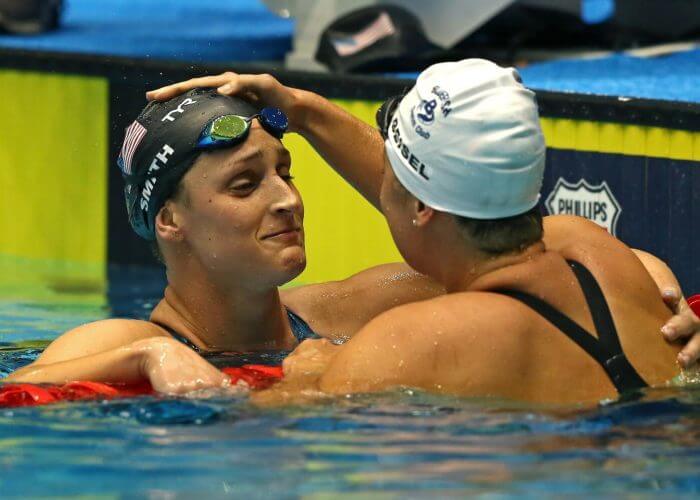What it Means to be a Team Captain

By Haley Wen, Swimming World College Intern.
Being a team captain is a unique role to play. Although every team follows a slightly different procedure for voting, team captains are known to be teammates who have exhibited exceptional behavior both in and out of the pool. So exceptional that their peers have elevated them to this position of leadership.
Each team will differ about what exact responsibilities are performed by the team captains, but the role is inherently complex. Captains are leaders but still swimmers. They are subject to the authority of the coach yet have a different relationship with the coach than the average team member. Navigating the responsibilities and expectations of such a position can be difficult, so it’s important to examine some of the duties that might be asked of a captain.
Lead by Example

Photo Courtesy: Taylor Brien
This point seems obvious. A team captain can’t be someone who doesn’t practice what they preach when it comes to the important things. They should be cheering for teammates every race they can at meets, they should be the first ones in and the last ones out of the water at practice, and so on. This doesn’t mean that captains need to be perfect. However, they should be aware of the effect they have on the rest of the team. Leading by example is crucial.
Communication

Swimmer and coach discuss race strategy on deck. Photo Courtesy: Hayley Good
Being a captain requires a certain amount of trust, not only from a coach but also from their fellow swimmers. Captains can be seen as confidantes on a team. Sometimes, approaching a coach or other adult with an issue is intimidating – especially for college freshmen or new team members. The captains are the trusted people who swimmers should feel comfortable coming to with a problem that ranges from swimming to school or to their personal life. Teammates should be able to trust you not to gossip about what was shared and to help them connect with the right resources.
At the same time, the role of a captain is also acting as a liaison between swimmers and coaches. Because captains are not coaches or a regular swimmers, they have the ability to hear out both sides in any disagreement. They also have the responsibility to navigate appropriate solutions according to their judgement. Christina Dietzen, an Olympic gold medalist in volleyball, has served as team captain in the past. On this subject, she shared that “you need to be able to hear all sides of an issue. And you also need to be able to challenge the other side, whether it’s the players or the coaches.”
Making Sacrifices

Elizabeth Beisel, USA’s Olympic team captain in 2016, shares a moment with Leah Smith after the 400 IM at Phillips 66 Nationals in 2017. Photo Courtesy: Aaron Doster-USA TODAY Sports
Sometimes being a captain means putting the needs of the team before your own. One way this happens is when you push yourself outside of your comfort zone. Maybe you’ve been doing a great job leading by example, but you haven’t been very vocal at practice. Loud is not your strong suit. If the team seems to be needing more encouragement at practice, it’s the captain’s job to help build them up, even if it’s difficult. Pushing yourself is part of being a captain and a leader.
In addition, sometimes being a captain means that you sacrifice an amount of your personal time and energy to go the extra mile for your teammates. Elizabeth Beisel, Olympic swimmer and national champion, served as a team captain of the women’s Olympic swim team in 2016. In an interview with Swimming World, she talked about some of the extra things she made sure to do during the meet in order to help facilitate the success of Team USA. Beisel said that she “made sure every single person was taken care of before their races – whether that meant walking Hali Flickinger to the ready room or helping Kathleen Baker put on her suit before her final.”
This doesn’t mean the captain should ignore their own needs to be successful. But it does mean making certain sacrifices for the greater good of the team.
Serving the Team

Denison teammates share a happy hug after a surprising race. Photo Courtesy: Denison Athletics Communications
Captains are leaders. At the end of the day, they serve the team. They address issues which get in the way of success and should constantly be looking for ways to facilitate improvement. Being a captain can be a prestigious position; many captains are elected by their teammates. But before being swept up in the pride of being named a captain, everyone chosen should ask themselves, “How can I best serve my teammates?”
-All commentaries are the opinion of the author and do not necessarily reflect the views of Swimming World Magazine nor its staff.




Great story!!
Paige Mitchell
Giulia Brickl
Marie Smith Powers
Julie Hrusovsky Snider great article!
Kinsey Lacey Bobby Maggie wise words.
Chantelle Campbell ?
Nice article! But we were not that fortunate
Storm
Marie Swisher❤️
Bryn Waller
Oh sh**. I don’t cry. Ever. But I was My USS age group captain for 12 years, plus 6 high school teams of various sports….a lonely place that ended up in my lap more often than not. I busted my behind to be a good one and only rarely did I feel the other kids quite understood the burden it put on my shoulders. I dunno why exactly reading this effected me like it did, but I’m glad someone wrote on it. Kudos